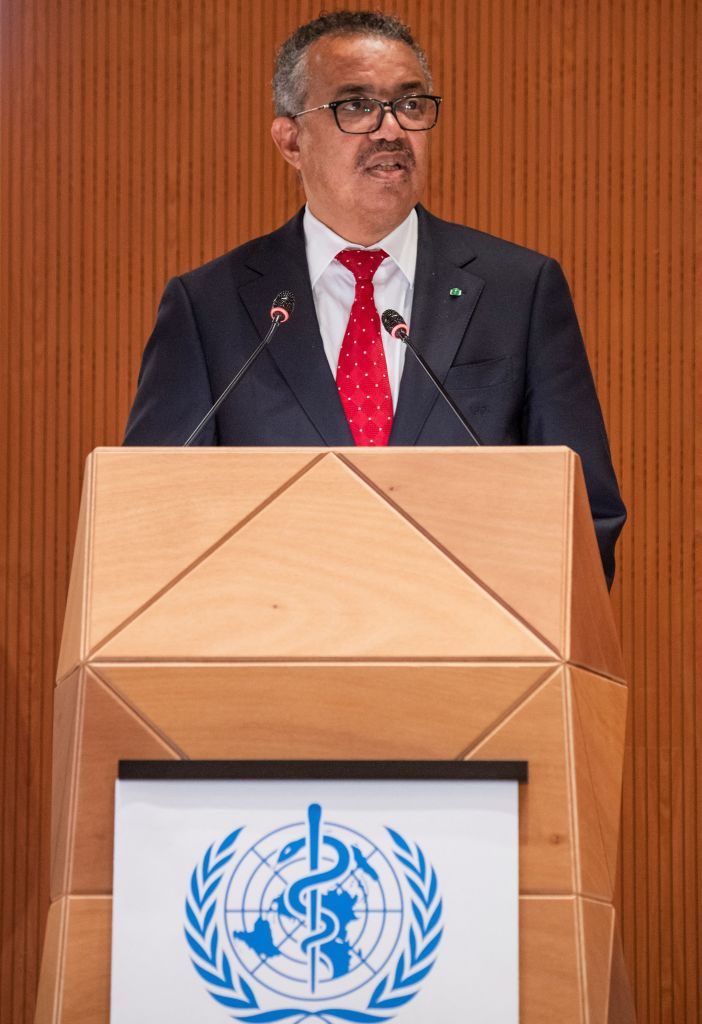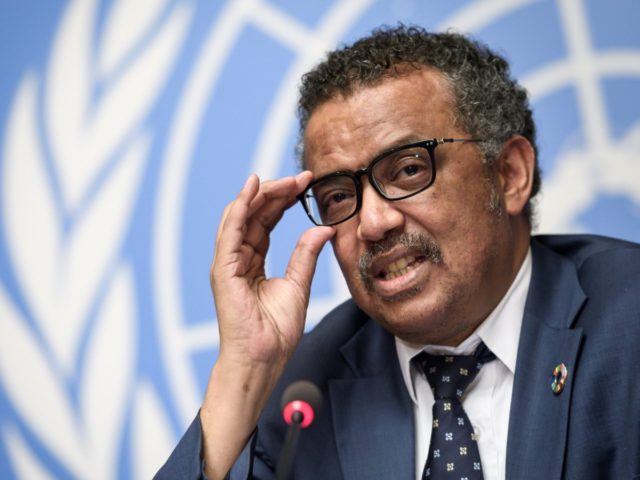The World Health Assembly, which is the decision-making body of the World Health Organization (W.H.O.), adopted reforms on Tuesday that would boost financing to the W.H.O. by as much as $600 million per year starting in 2028.
The World Health Assembly is comprised of representatives from the W.H.O.’s 194 member states. The governing body adopted several recommendations on May 24 that “target a gradual increase of their assessed contributions (membership dues) to represent 50% of WHO’s core budget by the 2030-2031 budget cycle, at the latest,” according to a press release published by the W.H.O.’s website.
“In the last budget biennium, 2020-2021, assessed contributions represented only 16% of the approved programme budget,” the W.H.O. noted.
Detailing the World Health Assembly’s new financial plan, the United Nations (U.N.) public health body continued:
It is intended that the gradual increase to assessed contributions will start with WHO’s 2024-25 budget, with a proposed 20% increase over the assessed contributions in the approved 2022-23 base budget. The aim is to reach 50% of WHO’s budget by 2028-2029 if possible, and by 2030-31 at the latest, up from the current 16% in 2020-21.
This would mean that by 2028-2029, WHO would see an increase of roughly US$ 600 million a year in the part of its income that comes from the most sustainable and predictable sources.
The World Health Assembly is currently holding its 75th annual meeting in Geneva, Switzerland, from May 22 to May 28. The gathering marks the first in-person summit of the governing body since the start of the Chinese coronavirus pandemic in March 2020.
Taiwan’s government expressed “dissatisfaction” with the W.H.O. on May 19 for its refusal to grant Taipei an invitation to attend this year’s World Health Assembly. Taiwan, which is a sovereign island nation claimed by Beijing as a province of China, led a failed campaign in the weeks prior to the summit’s launch to obtain limited observer status at the forum.

World Health Organisation (WHO) Director-General Tedros Adhanom Ghebreyesus delivers a speech on the opening day of 75th World Health Assembly of the World Health Organisation (WHO) in Geneva on May 22, 2022. (JEAN-GUY PYTHON/AFP via Getty Images)
“We find it deeply regrettable that the WHO has once again failed to remain professional and politically neutral to extend an invitation to Taiwan,” Taiwan Foreign Ministry spokeswoman Joanne Ou told reporters in Taipei on May 19.
“Apparently, the WHO has no intention of giving a response on the widespread international support for Taiwan,” she added.
Taipei’s unsuccessful campaign to procure a seat at the 2022 World Health Assembly marked its sixth such endeavor in as many years. Observers believe China, which is one of the W.H.O.’s most powerful members, has unofficially blocked Taiwan’s attempts to participate in the summit in recent years. China’s ruling Communist Party regularly quashes Taipei’s efforts to gain recognition of its sovereignty by global institutions like the U.N.
“The Republic of China [Beijing’s official name for Taiwan] was expelled from the WHO in 1972, one year after losing its seat in the UN. It was able to send delegations to participate in the WHA as an observer under the designation ‘Chinese Taipei’ from 2009 to 2016, when relations between Beijing and Taipei were warmer during the then-Chinese Nationalist Party (KMT) administration,” the Taipei Times recalled on May 20.
“Since 2017, Taiwan has been excluded from the WHA due to opposition from China, which has taken a hard line against President Tsai Ing-wen and her Democratic Progressive Party,” according to the newspaper.
The U.S. has been the W.H.O.’s top individual donor in recent years, with Washington contributing more than $400 million to the organization in 2020. The public health body’s budget was about $6 billion for the fiscal year spanning 2018 to 2019. The administration of U.S. President Donald Trump announced plans to defund the W.H.O. in April 2020 due to the organization’s “severely mismanaging and covering up” of the severity of the Chinese coronavirus in late 2019 and early 2020.
Taiwan’s government tried to warn the W.H.O. of the then-novel coronavirus in December 2019 but the organization “mostly ignored” Taipei’s relevant messages.
“Taiwan did report our concern on the severity of coronavirus last December to the WHO,” the Taipei Economic and Cultural Representative Office (TECRO) confirmed to Breitbart News in March 2020. “But as a rule, our reporting is always a one-way street. WHO mostly ignored our messages and never shared information as they do to other countries.”
The administration of U.S. President Joe Biden restored funding to the W.H.O. in January 2021.

COMMENTS
Please let us know if you're having issues with commenting.